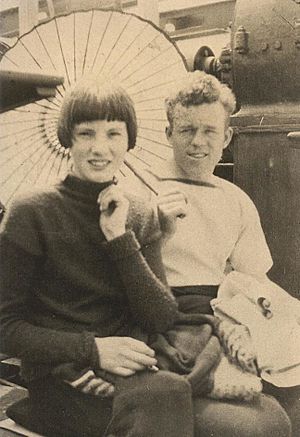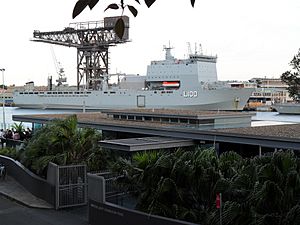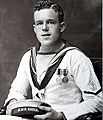Claude Choules facts for kids
Quick facts for kids
Claude Choules
|
|
|---|---|
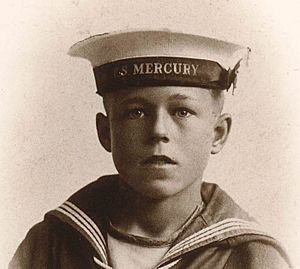
Claude Choules, aged 14 in 1915
|
|
| Born | 3 March 1901 Pershore, Worcestershire, England, United Kingdom |
| Died | 5 May 2011 (aged 110 years, 63 days) Salter Point, Perth, Western Australia, Australia |
| Allegiance | |
| Service/ |
|
| Years of service | 1915–1956 |
| Rank | Chief Petty Officer |
| Commands held | Acting Torpedo Officer, HMAS Leeuwin Chief Demolition Officer, HMAS Leeuwin |
| Battles/wars | |
| Awards | British War Medal Victory Medal Ribbon War Medal (1939–1945) UK Ribbon Australian Service Medal (1939–1945) Ribbon Queen Elizabeth II Coronation Ribbon Centenary Medal Australian Defence Medal Naval Long Service and Good Conduct Medal |
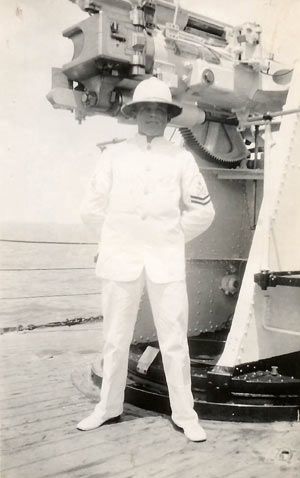
Claude Stanley Choules (born 3 March 1901 – died 5 May 2011) was an amazing military serviceman. He was born in England and became the oldest combat veteran of the First World War from England. He served in the Royal Navy from 1915 to 1926.
Later, he moved to Australia and joined the Royal Australian Navy from 1926 to 1956. He became a Chief Petty Officer and an Australian citizen. Claude Choules was the last person alive who saw the German fleet sink itself in Scapa Flow in 1919. He was also the last veteran to have served in both world wars. When he died, he was 110 years and 63 days old. He was the oldest known living man in Australia. In December 2011, a ship, HMAS Choules, was named after him. This was a special honor, as it was only the second time a Royal Australian Navy ship was named after a sailor.
Contents
Who Was Claude Choules?
Claude Choules was born in Pershore, England, on 3 March 1901. He grew up in a small village nearby. He was one of seven children. When he was five, his mother left, and he was told she had died. His father raised him and his older brothers.
When the First World War began, Claude was 13. His older brothers had joined the army in Australia and fought in the Gallipoli Campaign. When Claude turned 14, he tried to join the army as a bugler boy. But he was too young and was not allowed to join.
After being turned away from the army, Claude's father helped him join the navy instead. In April 1915, at just 14 years old, Claude joined a training ship called TS Mercury. This ship was located on the River Hamble in England.
His training included trips to a hospital as part of the ship's dancing team. After his training, Claude passed his exams. This allowed him to go to an advanced class on another naval training ship, HMS Impregnable. He moved there in October 1916. This was the final step before he joined the main Royal Navy fleet.
On 20 October 1917, Claude Choules joined the battleship Revenge. This was a very important ship stationed at Scapa Flow in the Orkney Islands. While serving on this ship, Claude saw battles against German airships called zeppelins.
He also witnessed the surrender of the German Imperial Navy in 1918. Ten days after the war ended, he saw the German fleet sink itself in Scapa Flow. This was a very rare and historic event.
Moving to Australia
In 1926, Claude was one of 12 senior sailors from the Royal Navy sent to Australia. Their job was to be instructors at a naval base. He traveled to Australia on a ship called SS Diogenes. On this six-week journey, he met Ethel Wildgoose, who would become his wife. She was traveling to Australia for work.
Claude liked the Australian way of life so much that he decided to stay. He permanently joined the Royal Australian Navy (RAN). He left the RAN in 1931 but stayed in the reserves. He rejoined the RAN in 1932 as a chief petty officer and instructor. He never went back to England after that.
Service During World War II
During the Second World War, Claude Choules had important roles. He was the acting Torpedo Officer at HMAS Leeuwin, a naval base in Western Australia. He was also the Chief Demolition Officer for the western part of Australia.
His job was to destroy the harbors and oil tanks in Fremantle if Japan invaded Australia. Claude was also in charge of dealing with the first German mine that washed up on Australian soil during the war.
After the Second World War, Claude stayed in the RAN. He moved to the Naval Dockyard Police (NDP). This allowed him to keep serving until 1956, as sailors usually retired at age 50, but NDP staff could serve until 55.
Claude Choules's Personal Life
Claude Choules and his wife Ethel were married for 76 years. Ethel passed away at the age of 98. Claude did not like big celebrations of the end of wars. He felt it made war seem glorious, which he was against.
His life story, called The Last of the Last, was published in 2009. In August 2009, even though he was almost blind and deaf, he was still very sharp. He gave a television interview. Claude celebrated his 110th birthday in March 2011. In his final years, he lived in a care home in Perth, Australia.
Media and Legacy
Claude Choules appeared in BBC documentaries about World War I veterans. After he died, the Australian Prime Minister, Julia Gillard, said that Claude and his generation made a great sacrifice for freedom.
Claude Choules passed away on 5 May 2011. He had three children, many grandchildren, great-grandchildren, and great-great-grandchildren. He had a naval funeral in Fremantle, Australia. Many important people attended, including government leaders.
On 13 December 2011, a ship was named HMAS Choules in his honor. This was because he was the last surviving veteran of World War I. It also recognized his service in both the British and Australian navies. Claude Choules was the last male veteran of World War I. After his death, Florence Green became the last surviving veteran of that war.
In 2014, a street in his hometown of Pershore, England, was named "Choules Close" to remember him.
Awards and Medals
Claude Choules received many awards for his service. In November 2009, he became the oldest person to receive the Australian Defence Medal. This medal is given to members of the Australian Defence Force who have served for more than four years.
He also received:
- British War Medal 1914–18
- Victory Medal 1914–18
- War Medal 1939–45
- Australia Service Medal 1939–45
- Queen Elizabeth II Coronation Medal (1953)
- Centenary Medal (2001)
- Royal Navy Long Service and Good Conduct Medal (with a clasp for 30 years of service)
Images for kids
 | Laphonza Butler |
 | Daisy Bates |
 | Elizabeth Piper Ensley |


